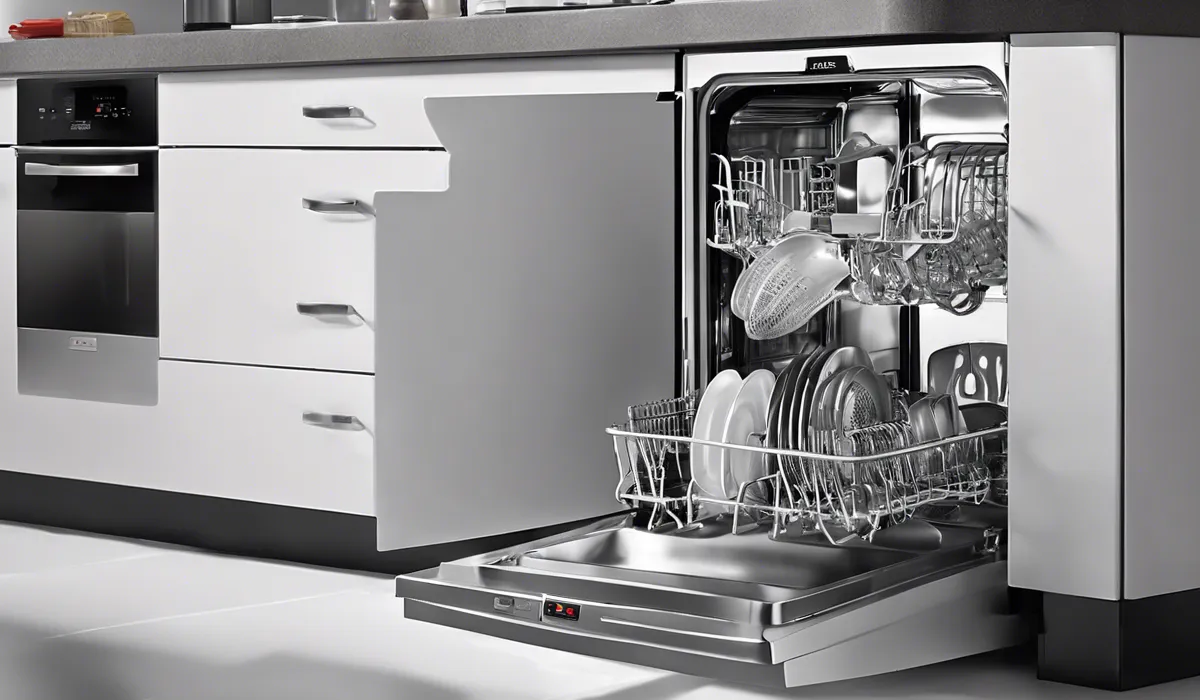Does a Dishwasher Sterilize? Unveiling the Truth About Cleanliness
Dishwashers clean, but they do not sterilize. The high temperatures can kill many germs, but sterilization, which eliminates all microbes, typically requires even higher heat or chemicals that dishwashers don’t use.
Understanding Dishwasher Cleaning Processes

How Dishwashers Get Dishes Clean
At the heart of a dishwasher’s function is its ability to spray hot water mixed with detergents onto dishes, breaking down food particles and grease.
This process involves multiple arms with jets that rotate and spray water at various angles, ensuring that all surfaces of the dishes are reached.
The combination of heat and detergents is what gives dishwashers their cleaning power.
Cleaning vs. Sanitizing vs. Sterilizing
Cleaning refers to the removal of dirt and debris, while sanitizing means reducing the number of bacteria to safe levels as determined by public health standards.
Sterilizing, on the other hand, is the complete elimination of all forms of microbial life, including bacteria, viruses, and spores.
Understanding these differences is crucial because while dishwashers can clean and sanitize, they do not typically sterilize.
Dishwasher Features That Affect Sanitization
Several features of dishwashers contribute to their ability to sanitize dishes. The temperature of the water is one such feature, with hotter water being more effective at killing germs.
The properties of the detergent also play a role, as some contain ingredients that can target and kill bacteria. The duration of the washing cycle is another factor, as a longer cycle can provide a more thorough clean.
Standards for Dishwasher Sanitization
Industry standards set by organizations such as the National Sanitation Foundation (NSF) dictate that a dishwasher should reach a final rinse temperature of at least 150 degrees Fahrenheit to sanitize dishes effectively.
These standards ensure that dishwashers are capable of reducing bacteria to safe levels, providing peace of mind to users.
The Efficacy of Dishwashers in Sterilization

Defining Sterilization and Its Rigorous Standards
Sterilization is a stringent process that requires the destruction of all microbial life. This level of decontamination is often reserved for hospital settings and laboratories.
In these environments, equipment is sterilized using high-pressure steam, chemicals, or radiation, which are methods that go beyond the capabilities of a standard home dishwasher.
Home Dishwasher Temperature Ranges
Most home dishwashers reach water temperatures of 130-170 degrees Fahrenheit during the main wash and final rinse.
While this is hot enough to sanitize, it does not meet the threshold for sterilization, which often requires temperatures upwards of 250 degrees Fahrenheit or the use of specific sterilizing agents.
The Role of Detergents and Rinse Aids
Detergents and rinse aids in a dishwasher work together to clean and aid in the sanitization of dishes.
The enzymes and other cleaning agents in detergent help to break down food and stains, while rinse aids contain ingredients that help dishes dry without spots or streaks, which can also help prevent the growth of bacteria.
Studies on Dishwasher Effectiveness
Research has shown that dishwashers are effective in reducing the number of bacteria on dishes.
Studies analyzing the bacteria present before and after a dishwasher cycle have noted a significant decrease in bacteria levels, indicating that while not sterilizing, dishwashers do contribute to a healthier kitchen environment.
Enhancing Dishwasher Performance for Maximum Sanitization

Optimal Loading Practices
For a dishwasher to sanitize effectively, it’s important to load it correctly. This means placing dishes in such a way that water and detergent can reach all surfaces.
It’s also important to avoid overloading, as this can prevent dishes from getting clean and may leave food residue that can harbor bacteria.
Settings for Enhanced Sanitization
Many dishwashers have a sanitize setting that increases the water temperature or extends the washing cycle.
Using this setting, especially when dealing with baby bottles or cutting boards that have come into contact with raw meat, can increase the sanitization effectiveness of your dishwasher.
Products to Boost Sanitation
Adding a dishwasher sanitizer or using vinegar as a rinsing agent can further enhance the sanitization process.
These products work with the dishwasher’s heat and detergents to kill more bacteria.
However, it’s important to follow the manufacturer’s instructions to avoid damaging the dishwasher or dishes.
Maintenance for Optimal Performance
Regular maintenance of your dishwasher is essential for it to function at its best. This includes cleaning the filter, checking the spray arms for clogs, and using a dishwasher cleaner to remove any build-up of grease or limescale.
Keeping your dishwasher in top condition ensures it can sanitize dishes effectively.
FAQs About Dishwasher Sterilization
Does a dishwasher completely sterilize dishes?
No, a dishwasher does not completely sterilize dishes; it cleans them but does not achieve the sterilization level that eliminates all microbes.
Can a dishwasher kill bacteria on dishes?
Yes, the high temperatures in a dishwasher can kill many bacteria on dishes.
Is sterilization possible in a residential dishwasher?
Sterilization, which requires higher heat or chemicals than those used in residential dishwashers, is typically not possible in a standard home dishwasher.
What temperature would a dishwasher need to reach to sterilize dishes?
Dishwashers would need to reach temperatures above the standard cleaning range, often around 250°F (121°C) or higher, for a sustained period to achieve sterilization.
Can I use chemicals in my dishwasher to sterilize dishes?
It is not recommended to use chemicals not intended for dishwashers to sterilize dishes, as they can be harmful and may damage the dishwasher or dishes.
Final Thoughts
While dishwashers are effective at cleaning items by removing food particles and grease, they do not truly sterilize.
The heat within a dishwasher can dispatch many common germs, but complete sterilization, which requires higher temperatures or specific chemicals, is not achieved by standard dishwashing processes.





